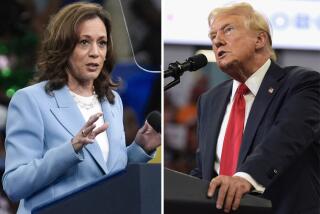A Giving Pledge for the common citizen
- Share via
The tax bill passed this month perpetuates the huge unfunded giveaways to the rich that have for a generation increasingly divided our nation. Rebuilding the American middle class requires tackling this growing divide head-on. If our politicians won’t or can’t, then ordinary Americans must and can.
Those who believe the tax deal gives too much to the top should devote at least some of their tax cuts to charitable causes that embody fairer policies and send a clear political message: We are in this together.
The need is pressing. Despite the recession’s end, high unemployment and ongoing economic instability continue to inflict hardship on millions of workers and their families. Meanwhile, Wall Street bonuses are rising again and the richest continue to prosper.
Our broken political institutions are blocking an adequate public response. The tax deal has some good elements. The payroll tax holiday will boost employment (but it could also create risks for Social Security’s long-term standing). The extension of unemployment benefits, so vital for the jobless and for encouraging a fragile recovery, should never have been controversial. But the Republican Party has insisted, as the price for begrudgingly permitting a modest amount of spending on recovery, that the rich get more than their fair share.
This is bad policy. The outsized tax cuts for the richest Americans and their heirs subvert the principle that those who benefit the most from the American project should pay the most to carry it forward — “not for class warfare reasons,” President Clinton reminds us, but “for reasons of fairness and rebuilding the middle class in America.”
These “reasons of fairness” apply especially in hard times, when those with the biggest cushions should take on a commensurate share of the burdens. When political institutions use taxes paid by all to bail out institutions that are perceived to benefit only the wealthy few, our sense of shared fate is threatened. The economy looks less and less like a common project and more and more like an exclusive party to which only some Americans are invited but for which all have to pay.
To their credit, many of the most fortunate Americans believe they should contribute more. The Giving Pledge campaign, started by two of the nation’s wealthiest citizens, Warren Buffett and Bill Gates, encourages the super-rich to donate half or more of their fortunes to charity.
But that does not mean the rest of us have to sit by. Ordinary Americans can, as in earlier periods of national crisis, join together to invest our private actions with public meaning. We cannot make law or fiscal policy, of course. But we can and should act to mimic sound and decent policy.
Americans who can afford it should contribute the windfall that they receive because of the Republicans’ obstructionist demands to charities that promote the programs — job creation, housing, education and the like — that they believe a just government should pursue.
This would be a kind of Giving Pledge for the common citizen, a way of converting the private generosity that so many Americans demonstrate into public solidarity. It would be an expression of the indelible idea embodied in our Pledge of Allegiance of “one nation, under God, indivisible, with liberty and justice for all.” Pursued under this banner, philanthropy would become “political” in the best sense of the word.
We have created a website to assist in this task, GiveItBackforJobs.com. Yet we mean our effort only as a signal of the need for a broad national movement to protest the ongoing forfeiture of the public good for private gain.
Nothing can take the place of a just tax policy. But political philanthropy can provide immediate help to struggling families. And through its public purpose, it can serve as a form of protest that reclaims American ideals from a legislative process that has squandered them. By putting our money where our mouths are, perhaps we can light a path to better policies — and a better American politics.
Jacob S. Hacker is a professor of political science at Yale University and the coauthor of “Winner-Take-All Politics: How Washington Made the Rich Richer — and Turned Its Back on the Middle Class.” Daniel Markovits is a professor at Yale Law School and the author of “A Modern Legal Ethics: Adversary Advocacy in a Democratic Age.”
More to Read
Get the L.A. Times Politics newsletter
Deeply reported insights into legislation, politics and policy from Sacramento, Washington and beyond. In your inbox three times per week.
You may occasionally receive promotional content from the Los Angeles Times.










